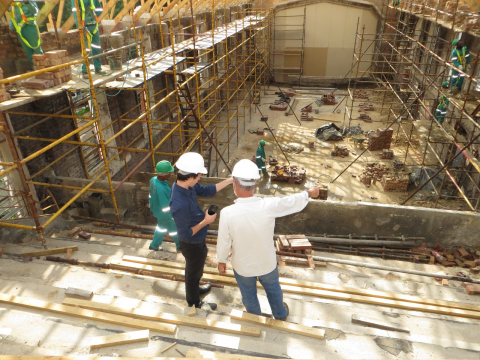5 ways of how to reduce costly rework on construction projects

Did you know?
In the construction industry, projects take 20% more time than primary estimation. Wait; let me provide you another number. Large projects cost 80% more than the budget planned.
For an industry worth nearly 13 trillion US Dollars, these stats are alarming. The reasons are diverse. From lack of coordination to unreliable logistics. Nevertheless, we focus on a profound issue. An issue that has cost big dollars yet is overlooked most of the time.
Rework. If you think construction is all about meticulous planning and military-like precision, you are wrong. In construction, rework is common, but the impact is unparalleled. The adverse impact on construction is of an enormous scale.
So, how can a construction company reduce rework?
Before we delve into the tips to reduce construction rework, let us see what the results of rework are.
- Lengthy delays,
- Additional costs,
- Loss of trust,
- Legal issues,
- Morale-kill for workers,
- Extra efforts and many more.
No construction company would desire any of the above. Knowing what is at stake, here are 5 ways on how to reduce construction rework costs.
The primary element is always the pre-construction routines. Without this step, faulty construction and large-scale rework are no-brainers.
Rework and lack of planning go hand-in-hand. The lack of planning can be attributed to varied reasons. By prioritizing planning, productivity enhances. From assembling the required resources to delegating tasks among the workforce. This also reduces redundant activities.
Planning is more than one process. It starts with strategic planning where the project managers and the clients discuss. This outlines the goals of the project. The budget, the time required, and resources too will be estimated.
Then, it moves to operational planning. This stage details the human capital, policies, and other specifics. Furthermore, proper scheduling and task allocation take place. This type of comprehensive planning will reduce delays and rework.
Planning can happen only when the project site is surveyed properly. For this, topographic maps and structural surveys are required. The most efficient and safe way for surveying is the use of drones. Lower costs, and reliable visibility, make this a perfect weapon during construction.
Once the planning is in place, its execution depends on how well it is communicated.
Communication propels planning into execution. So, it is important for management to communicate. Yes, providing the information is the main aim. But, reducing guesswork is also of similar importance.
A construction project involves many stakeholders. With a lot of stakeholders comes multiple communication channels. First, it is not as easy as creating a group on social media and gathering everyone.
Hence, the management must clarify the communication structure. Alongside, every employee must know their communication channels. Often ignored is the system of reporting. If any issue is to be escalated, workers must be provided with a robust reporting system.
This kind of two-way communication serves as the basis for proper execution. This also reduces the time and wastage of efforts. Since the tasks are well-defined, the scope for rework is narrowed.
Now, the planning is in place. Tasks are defined and conveyed. Now, assembling the resources and tools is crucial.
Oftentimes, faulty construction services are a direct result of inadequate resources. At times, poor quality resources are also the reason. These end up needing expensive rework.
Reducing rework and enhancing quality is the aim.
Investing in the right tools and resources is the path.
Yes, they are expensive, but the benefits far outweigh the costs. From machines to project software, quality tools can propel the work to new heights. The streamlined workflow, safety mechanisms are unrivaled. With proper training, the workers can bolster the construction process.
So, as the execution starts, certain issues are inevitable. To reduce their impact, regular quality checks are needed.
Every process during construction calls for many tasks. So, evaluating and comparing them to check for quality is tedious. But, the lack of quality checks can finally result in rework. Though it is tiring, quality assurance is of high importance.
So, implementing quality standards must be a priority for any construction company. To reduce the efforts, standards can be automated. With the help of digitization, technology will do control checks.
This removes human error too. While the project manager review is mandatory, the frequency can be altered. Likewise, as and when deviations are found, corrective measures can be adopted. By automating quality checks, the scope for rework is reduced.
Also, schedule the oversight and reviews. This helps in recording the progress. Also, this reduces unnecessary efforts.
The construction industry has not yet faced large scale automation. Hence, reliance on human capital is high. So, it is quite obvious that the human capital forms the crux of the construction services. So, the quality of the construction is influenced by their skill levels.
The traditional construction workers do not invest in further training or building knowledge. Their mere presence and hard work are what they believe in. Their lack of awareness is profound. Note that automation and robotics are crawling into the industry’s workforce. So, the existing workers are replaceable.
Note: If the skill-level remains the same, you cannot expect better results. So, investing in the training and up-skilling of employees is inevitable. The returns on this investment will be manifold. So, training employees to use modern equipment and machinery is needed.
What this measure provides to the company is the increase in quality workers. This adds to the company’s productivity. Better workers and quality work are not that distant. Hence, this again reduces rework.
Conclusion:
In a Construction Industry rework can never be eliminated. But, these tips to reduce rework and enhance quality can save a lot of money and effort.
